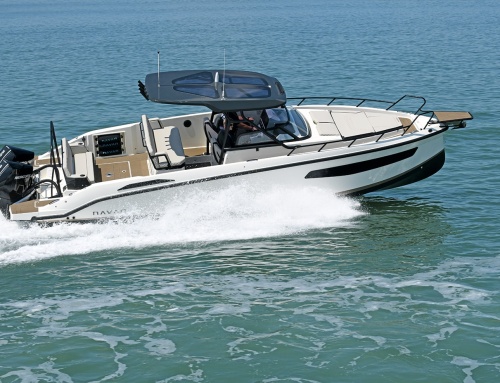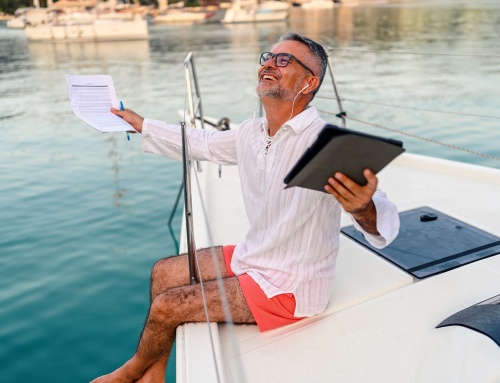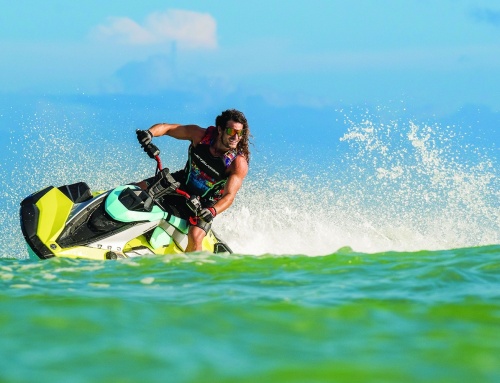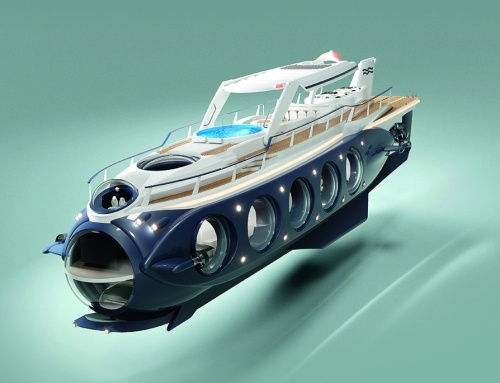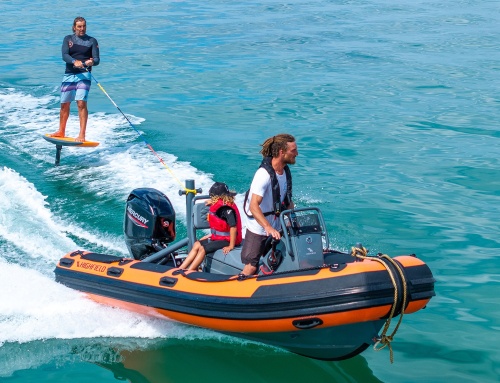Scuba divers on the Red Sea Liveaboard Carlton Queen, which capsized in April 2023, view the incident and its aftermath very differently to the vessel’s operator. Christian Hanson, a UK diver on that fateful voyage, tells of his and his fellow passengers’ escape, the aftermath and the critical lessons learned …
FK scuba diver Christian Hanson has been around boats for many years – ‘everything from rowing boats to battleships’. A PADI IDC staff instructor at Academy Divers in West Yorkshire, he has also dived the Red Sea many times, including in the spring of 2023 when he and fellow diving enthusiasts boarded the Red Sea-based liveaboard dive charter vessel the Carlton Queen.
‘I’m a dive addict,’ said Hanson, before then sharing his comprehensive account of his experiences up to and surrounding the capsizing of the ill-fated charter boat.
On Saturday 22nd April, Hanson and his wife were in Egypt with a group of friends enjoying the facilities of a Spanish-run dive centre. They were on a similar itinerary to an earlier trip they’d enjoyed in northern waters just a couple of months prior to this, but this time they’d chosen to take advantage of some sunshine and duly book themselves onto the Carlton Queen, a vessel operated by Carlton Fleet Red Sea and promoted as having been built in 2022.
Despite the operator’s claim, it seems, however, that this was not a new vessel at all but rather an enlarged and modified version of the original Carlton Queen that had been working in the Red Sea over a period of some 20 years. Since its recent emergence from dry dock, it had been to sea only once – carrying a party of kitesurfers just one week before the Hansons’ trip was due to take place.
Hanson, though, had sailed with Carlton Fleet before, in 2022 in fact, at the suggestion of another member of the group, although upon learning that the Carlton Queen had gone for a refit, they had been assigned to another liveaboard called Life Story. On that occasion, all had gone well enough for the friends to book again for the April 2023 charter.

The Carlton Queen captured moments before going under
Listing to starboard
The 42m Carlton Queen was built to accommodate 28 guests, with six double cabins above and eight below decks. The previous incarnation of the liveaboard had been advertised as being 6 metres shorter, with a capacity for 22 guests housed in 11 cabins. Twenty-six guests had booked for the 2023 trip in question, joining a crew of nine and three dive guides. Boarding in Hurghada on Saturday 22nd April, Hanson states though, with some significance, that he immediately spotted that the boat was listing ‘a couple of degrees’ to starboard. He also noted that the saloon doors leading from the dive deck opened outwards.
A dive briefing was held that night, ‘which is unusual,’ Hanson explained, ‘as this was the first-ever night briefing I’d known on an arrival day.’ The session included the location of the escape hatch for the lower-deck cabins, as well as where to find life vests and safety information. The starboard tilt came up in conversation, but it was explained away as being connected with taking on water in the tanks and the boat needing time to ‘settle’.
Upon moving off the next day, however, Hanson estimated that the degree of list had become even more pronounced – by his estimation, a further 5–7°. Captain Mohamed Al Dandrawi Abdul Rahman cited the water tanks and said that as a new boat, she needed to ‘soak up water’ in order to ‘sit straight’.
Three dives were carried out but the list remained, and when Hanson got up at about 4am on the Monday for an early dive, he reckoned the list had reached 20–30°. This time, however, the captain put it down to the passengers’ unbalanced use of the bathrooms! Not long after, the tilt then overcorrected itself to 5° to port.
Hanson recalled: ‘I remember saying to the dive guide, “I hope the captain takes it nice and steady across the strait, as I believe the boat might have some stability issues with its ballast”.’
He believed the keel to be shallow for such a tall boat, but, like other guests, a number of whom held yachting licences, he could not believe that the captain, who purported to own this boat, would risk this considerable vessel and the lives of those on board. ‘Clearly there was an issue,’ said Hanson, ‘but it appeared to be manageable because he’d apparently been able to correct the heave.’

The Carlton Queen deck layout.
When floor becomes wall
Following breakfast, the Carlton Queen left Sha’ab Abu Nuhas, heading for Ras Mohammed. Hanson was sitting in the saloon chatting to two other guests at the time, a female Divemaster (DM) and a male Master Instructor (MI). On encountering the swell in the Strait of Gubal, he said he saw chairs suddenly shift to starboard before the boat then quickly appeared to momentarily stabilise. But then, the boat swung to port significantly before swaying a long way starboard. Hanson shouted a warning to the others to lift their legs as tables slid across the laminate flooring and smashed into the sofas where they were sitting near the saloon doors to starboard. ‘Next, the boat heaved violently to port and that was it – it tipped all the way to starboard, and we were catapulted off the chairs and onto the windows,’ said Hanson.
‘We were now standing on the windows, looking up at an almost-vertical climb to the closed saloon doors! My immediate thought was that this was what was going to kill us. I remember shouting that we had to wait. I could also see that the sofa just above our heads was still moving and pulling away from the wall. I’m not tall, so I needed something to climb onto in order to reach the doors. At this point the other two divers were already trying to climb the furniture while water could be seen jetting through gaps around the windows we were standing on. It was only a matter of time before they would give way.’
According to his account, the boat shifted again, releasing a sofa directly above the divers’ heads and knocking the others back down onto the windows. From below decks they could hear the cries of two fellow guests, a father and son, amid a cacophony of smashing and crashing as heavy dive tanks rolled about. There would be no way of reaching anyone below with the stairs now 8 metres above the three divers’ heads, he thought, never mind the vertical climb up the impossibly slippery floor.
Breaking out of the saloon
Fortunately, two sofas had now combined to form a platform, which enabled Hanson to climb their hessian backing, hoist himself on top and struggle onto a cupboard near the door, banging his head in the process. He could now see out through the saloon door and realised he’d need to smash its tempered glass.
The waterline was about 3 metres below them now, and with the boat pitching bow first with its engine still running, the cupboard on which he was perched was tilting dangerously.
Swinging himself backwards and forwards on the door handles to build up momentum, he finally succeeded in shattering the glass. Then, while straddling the door frame, the Master Dive Instructor was able to climb over him and onto the cupboard before leaning over and attempting to lift his fellow Dive Master, whereupon Hanson grabbed her foot, and they heaved her onto the cupboard.
The MI shouted for Hanson to go! He swam for all he was worth, out over the dive deck toward one of the vessel’s two RIBs, on which he could see his wife sitting.
Hanson continued: ‘The RIB did a man-overboard turn and I was pinned between it and a life raft, at which point I elbowed them apart and heaved myself in, being dragged the final part of my journey by the seat of my shorts!’
Significantly too, he recalled how, to his surprise, the captain was already aboard the life raft. In addition to its two RIBs, the Carlton Queen carried two 20-person life rafts. The captain had apparently launched one of these. The other, Hanson was told, had deployed automatically, then subsequently inverted and been swept away.
According to witnesses on the ‘fly deck’, when the Carlton Queen rolled over, one RIB crushed the other. The one now in use had eventually flipped out and damaged itself in the process, suffering a deflated stern and leaving the other RIB wedged/snagged below the mother vessel.
Captain’s orders: Don’t use flares!
One fellow guest was shaking, clearly in shock, so Hanson did his best to attend to her. Hanson’s wife now joined him on the life raft. People were shouting and attempting to do a headcount as the raft filled up fast. Indeed, it appeared that the passengers, not the vessel’s crew, were directing the rescue. Galley staff, as well as some deckhands, were hanging off the side and back of the life raft. Some were openly praying. Two of the three dive guides were occupied trying to help their crewmates. The third guide was ‘in complete shock, unable to help anyone’, having been trapped for a time in his cabin by the water pressure.
Speaking of the guide, Hanson said: ‘Having to free-dive out through an inrush of killer water is not an easy thing to get over. The poor fellow just sat in the life raft, staring into space. We all felt for him.’
Meanwhile, the RIB driver was doing what he could to assist the badly shaken survivors. ‘The captain told us not to use the flares,’ Hanson recalled, ‘but we had a cargo container ship barrelling down on us. As it transpired, the parachute flares the captain tried to prevent us deploying failed to work anyway.’ But to everyone’s relief, the hand-held flares did work and, as a consequence, the cargo vessel signalled a change of course and heaved to.
‘We had over 30 people in the life raft at one point, and not surprisingly, it was proving very unstable,’ Hanson continued. ‘Thank goodness, the Vip Shrouq’s two RIBs arrived to evacuate us without further delay.’ The diving liveaboard, running out from Sharm El-Sheikh, had fortunately been in the vicinity of the accident and, after coming alongside, duly carried the Carlton Queen’s passengers and crew to safety, treating those rescued for shock and providing warm clothes, food and drink in the process. Deservedly, the Vip Shrouq’s crew were later commended for their prompt action by Egypt’s Chamber of Diving and Water Sports (CDWS).
A free-diving escape
Following the incident, Hanson later caught up with some of his fellow dive guests to discuss what they had witnessed. One person told him that he had been with the captain when the Carlton Queen capsized and said that the captain had turned the boat hard away from a wave before proceeding to launch and board the life raft. Another, a trainee RIB driver, claimed that she’d noted that the captain had been ‘aggressively trying to “cut” the waves’. As it transpired, she’d turned to her father and told him she thought the boat would overturn just a few seconds before her suspicions were proved true. Her mother, the only non-diver on board, had fallen into the water from the fly deck – a truly horrifying experience. As for the father and son whom Hanson had heard below decks amid the upturned chaos, to everyone’s relief, they did manage to escape. But upon boarding the Vip Shrouq in a state of shock, they were deeply concerned for the welfare of a missing passenger who had been trapped down below with them. They said that when the Carlton Queen capsized, they had gone to the cabin, where, according to the initial briefing, the safety hatch was supposed to be – only to discover that although it was marked ‘Emergency Hatch’, it was a false door, with neither hinges nor handles. The father had been injured by a dive tank falling from the saloon, but his son had managed to drag him out with the help of the now-missing guest, who had bravely told them to go ahead without him. All the son could do to help him was to pass him down an air tank.
The man had waited in darkness in the cabins below the saloon – a desperate place, made worse by the fact that there were no safety lights working. And only after it had filled with water was he was able to free-dive out through the saloon. By the time he had got clear of the semi-submerged vessel, the lifeboats were almost a mile away. It transpired that he’d stayed with the stricken vessel until, fortunately, he was spotted by the crew of a container ship.
Disappointing
‘The captain didn’t know how many guests were on board and gave the wrong number to the captain of the Vip Shrouq,’ claimed Hanson. The survivors were told that the captain took a RIB and returned to the vessel in an attempt to find the casualties’ passports, etc., but was unsuccessful. As a result, they lost absolutely everything. After two hours the group were transferred by a fast army patrol boat to Hurghada.
Next, Carlton Fleet sent a coach to take them to an all-inclusive hotel. There were no separate rooms, though – in fact, they included three shares, and many of the beds were riddled with bed bugs. ‘The hotel was in the throes of hosting a wedding for a local family, so we had to endure an eight-hour songfest of Egyptian techno-rock. The bass was shaking the buildings until midnight. You just couldn’t eat the food either. My wife had “the runs” after just one stuffed pepper!’ lamented Hanson.
‘The CDWS inspector who interviewed me said that it was not a tourist hotel, just very cheap.’ After what was described as a ‘huge argument’ with Simona Adelhoch, a dive instructor and administrator for Carlton Fleet, the guests arranged to be upgraded to a four-star hotel on the understanding that the operator would cover the cost.
Locals to the rescue
Without passports, everything became so much more complex for the survivors of the sinking. Money too was needed for emergency travel documents and the correct paperwork and photographs for the visa reissue. But incredibly, the local folk who saw the reports on TV came together and offered free clothes and arranged medication. By all accounts, they could not have been kinder or more helpful.
In contrast, the boat company was abusive and wanted to get rid of their injured guests. According to Hanson, when they discovered that the lack of passports was going to prove a major setback in the booking of flights, they began to get ‘legal’. As a result, Carlton Fleet wanted the guests to use their own dive and travel insurance to cover the resulting costs instead of claiming on their own company policy.
A new attitude to boat safety
‘All in all, it’s been a lesson,’ said Christian Hanson. ‘I was not expecting this at all. You think about fire more than drowning. I now look at boat safety in a whole different light. I’m literally going to take a tape measure on my next liveaboard charter trip and work out whether, in an emergency, escape is possible. But when I consider the reality of the situation, if that boat had capsized in an area devoid of shipping or other craft, or even at night, we’d all be dead.
‘My wife and I occupied a cabin that ran across the width of the boat, but if we’d been in that particular cabin at the time of the disaster, the water pressure would have been such that we would not have been able to open the door. The way the boat rolled over it would have filled from the door, because on the other side the bulkhead merely possessed a porthole.
‘I’m a certified basic free diver, but even so, I don’t fancy my chances of a finless breath hold from 8 metres down, opening a door and swimming up to the surface without getting snagged on anything or running out of leg power.
‘In Egyptian law, you have to state on the last line of your witness statement whether you think what happened was a criminal act. To be honest, to this day I’m not sure what to write on that final, defining dotted line …’

@salvage_and_wreck
Watch footage of the incident below:
Watch the video courtesy of Salvage and Wreck
Watch on YouTube – Storyful News & Weather


Storyful News & Weather
Carlton Queen
Listen on BBC Sounds
BBC Radio Interview with Author, Christian Hanson
Watch the Daily Mail news story
The official’s response
The Carlton Queen and Sharm-based Carlton are among the 173 liveaboards registered with Egypt’s CDWS (the CDWS is the official source of information and guidance for all who may want to invest in the diving industry in Egypt), who were approached about whether the Carlton Queen had been inspected before it left dry dock. It replied by saying that the incident was being investigated by the ‘relevant authorities’. It continued: ‘Safari boats are considered maritime transportation, and the entity that is responsible for inspecting the condition of the boats and providing the sailing licences is the Egyptian Ministry of Transportation. It grants the permits after the boats meet the safety and quality requirements set by them. This includes the condition of the hull, engine, firing system, etc.’
Nevertheless, it is clear that it is the CDWS’s role to check the eligibility of an operation to provide diving and water sports activities and that they meet the safety and quality standards that qualify them to do business. This is done through yearly audits and frequent spot checks. As it transpires, the last audit done by the CDWS on the Carlton Queen was at the beginning of April 2023, whereupon the vessel was deemed fit for purpose, having met the CDWS’s requirements for safe diving and water sports activities.
Carlton Fleet’s retort
Carlton Fleet Red Sea were questioned over the allegations made by the guests, including the boat’s listing in dock, evacuation procedures, the treatment of the casualties after being rescued and whether the boat was in fact ‘new’ as the company had claimed. They stated the following:
“While we are deeply saddened about the accident, we are relieved by the safe return of all guests and crewmembers to shore. The Egyptian authorities are currently investigating the incident, and our staff members and crew are cooperating with them to identify the reasons for the boat’s capsizing.
We will abstain from making statements regarding the cause of the accident until the conclusion of the investigation, to avoid misleading those following the incident.
The Carlton Fleet team emphasises that the Carlton Queen, which was recently renovated, had undergone all required maintenance works, passed all inspections and was fit for operations as confirmed by technical reports.
Furthermore, the Carlton Fleet team finds itself compelled to address, albeit briefly, some of the ill-founded reports made with respect to the crewmembers’ handling of the guests, both at the time of the accident and until their return to their home countries. The safe return of all those on board bears testament to the crewmembers’ effective management of the situation, which spared the lives of all passengers. Fortunately, and notwithstanding any sensationalist allegations made by some disgruntled guests, only three divers sustained minor injuries that were treated in hospital at the company’s expense.
The Carlton Queen’s crewmembers followed the safety protocols applicable to the circumstances, leading to the swift evacuation of the boat. The captain fired six flares in the air immediately upon the occurrence of the accident, which alerted a cargo ship to the need for help, prompting it to change its course and secure the area. It is confirmed that the life rafts were released by the captain and another crewmember, who ensured that the rafts remained close to the boat, notwithstanding the strong wind and current, until all passengers could board them with the crew’s assistance.
Immediately upon reaching the shore, the members of Carlton Fleet escorted the guests to a hotel and provided them with clothing and any pharmaceutical products they needed. The following day, to guarantee their comfort, all the guests were transferred to an all-inclusive hotel of their choice.
We communicated directly with the British Consul to assist English guests with the issuance of new travel documents to replace those that were lost at sea while the guests remained in the hotel. We also wrote to all the embassies of the other guests’ nationalities to procure their assistance. German guests were driven to Cairo to receive the necessary documents there, after which they were driven by the Pyramids, upon their request.
Most of the guests travelled back to their countries on 29th April 2023. Those that were compelled to remain in Egypt until new travel documents were issued were lodged by the Carlton Fleet family in the same hotel they had chosen until their safe return to their families.
Besides the company’s coverage of all medical, accommodation and other expenses relating to the guests (including pocket money, new travel document fees and flight changes), the team offered to pay the guests additional amounts for their inconvenience before the conclusion of the investigation. Unfortunately, however, the company’s offer fell on deaf ears, and certain guests engaged in negotiation tactics and resorted to threats to strong-arm the Carlton Fleet into paying them larger amounts, notwithstanding their signature of releases and liability waivers and the charterer’s clear instructions that they procure insurance for loss or damage to equipment and belongings prior to boarding the boat.
The threats regrettably persisted following their safe return to their home countries. At last, we are cooperating with the Egyptian authorities to determine the cause of the accident and urge all those concerned to wait for the result of the investigation so that we may determine the next steps.”
Editor’s comments
While the official inquiry report is awaited, many lessons can be drawn from this account, and I am most thankful to our friends at Divernet for their permission and assistance in connection with the publication of this valuable feature. I consider this account to be of value to all of us who take to the sea in boats, large or small, that are owned by a third party. Perhaps you can think of other key points, but the object lessons I have derived from this concerning incident involving the Carlton Queen, include the following:
Above all, you are ultimately responsible for your own life. If you feel unsafe or have reason to feel your personal well-being and safety could be compromised or threatened, trust your own judgement. Never feel intimidated or pressured into complying with something because you feel embarrassed or don’t want to be seen causing a fuss. You always have the right to speak up and/or extricate yourself from a situation that you feel is unsafe or has the potential to endanger either yourself or those in your care. Stand your ground.
Whether the boat belongs to a friend or a professional charter company, satisfy yourself, at least to a reasonable degree, that the vessel is sound and that (a) you know where the safety kit is located and (b) it’s in reasonable working order.
Where possible, it can be prudent to carry, either on your person or in your own kit bag, your own personal safety equipment. It could be a knife, a hand-held VHF, a PLB or even a flotation device of some type. With regard to the latter, as we know first-hand, most airlines will not allow you to take a gas inflation life jacket on a plane. Nevertheless, there is nothing preventing you from packing a simple buoyancy aid. You would be surprised how many overseas press events we go to where the host has made no attempt at all to provide life jackets for those journalists in attendance.
If you notice something remiss about the vessel you are about to board, or the skipper’s attitude toward safety is lax, take your concerns seriously.
Especially when travelling abroad, ensure you have adequate medical and travel insurance.
Lastly, if you feel that the person driving the boat aboard which you are a guest or passenger is driving without due care and attention, or is demonstrating in any way that the safety of those aboard is not his chief priority, speak up and, if necessary, demand that your concerns are addressed. This could apply to a situation where the driver of a fast open boat makes the decision that it is not necessary to attach the kill cord. I refer to this as an example because I recall one such incident I was involved in some years ago when I was in the navigator’s seat during a high-speed test in the Arabian Sea.



